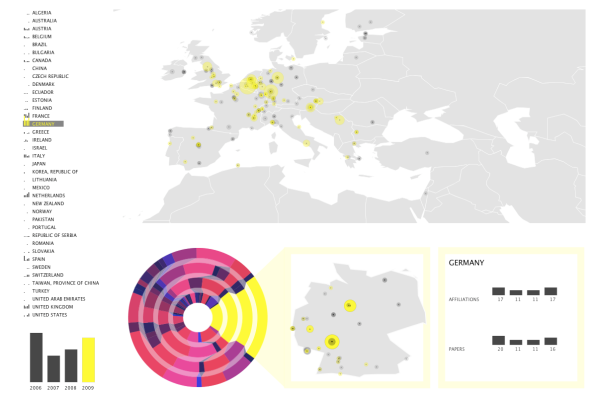Tres cool
To start with the conclusion, the way Peter formulated it: our Science 2.0 workshop on Tuesday was “Tres Cool”! Kind of appropriate for a workshop at at ECTEL09 in Nice, France…
There were some 25 participants, and you can read or contribute to the conversation through the #science twitter tag.
Some of the themes that stood out for me:
Obtaining and opening up clean data: all of us struggle with that. Even for such a limited exercise as only one conference series (ECTEL) and just authors, titles, affiliation, location and citation data, a group of people spent quite a bit of time and effort to obtain the data. How can we scale this up to all of the research in our domain? It seems to me that the open access movement should really pay more attention to this question: at least as important as making the actual papers available, it seems to me, is making the bibliographical data openly available – they are now locked up by Thomson-Reuters or Elsevier, and even if you do have access to those systems, you cannot easily get the data out to do your own analysis or visualization! It also seems to me that the publishers should be able to understand that this may help people to discover and find relevant papers, so this may actually increase traffic (and thus revenue?) for them…
Demo fear: I’m so often struck by the fear of many presenters to do a demo of their tools. Especially in a smaller workshop setting, I want to see the tools. Rough is fine, but show the tool: we can read the paper, but it is often not so easy to play with the tool! So, a round of applause to Wolfgang Reinhardt for showing twitterVisBT – a tool that helps to analyze twitter conversations. And, of course, I wanted to set a good example, so we did no presentation and just two demonstrations – with presenters skype’ing in from Ecuador and Germany: Xavier presented our ECTEL visualization and Till showed an early version of an alternative visualization (see below).

Till's visualization of ECTEL
Sharing ideas There was some discussion – prompted by Nicolas’ blog post, about whether it makes sense to share ideas – rather than results. As I mentioned at the workshop, I personally agree that the field of Technology Enhanced Learning is maybe too rich in ideas and not rich enough in hard results, but I think that this is a false dichotomy: sharing ideas does not prevent results from being achieved or shared?! Rather, I would think than an earlier discussion of ideas may make it easier to reach better results earlier? And, even if you worry about people stealing your ideas, you may still want to share early to establish yourself as the first who worked on something? This discussion led Martin to think a bit more about the pedagogy of abundance…
Limits to openness: Barbara asked a question that still has me thinking: are there things we do not want to share? Many of us are involved in preparing bids for the EU funding call late October: do we share openly our plans for such proposals? The answer was a somewhat embarrassed silence. I actually wouldn’t mind to prepare a bid in the open. But I also do think there are limits to what we want to share: for instance, we are interviewing candidates for open positions – I am not comfortable to share even who applied, as it might put some of them in a rather awkward position.
There was much more we discussed – recordings of the sessions will appear on the workshop web site next week (many thanks to Peter for recording!) and there is a lot of follow up activity planned, in my team and elsewhere… “Stay tuned for more!”
BTW, the opening ECTEL09 keynote by Peter Pirolli on social information foraging and sensemaking was very relevant in making explicit the overall context for this science2.0 work: definitely useful to help clarifying why we do what we do…

2 Comments
Leave a CommentTrackbacks